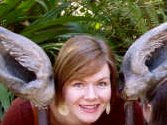More of . . .
I once read that speech pathology is a combination of science, linguistics, medicine, psychology, and teaching. I'd have to add counseling in there as well. For my undergrad I double majored in creative writing and communicative disorders, which to me made perfect sense. I got a lot of quizzical looks whenever I told people my majors, as if there wasn't much in common between the two. But really, it was all about a love of language.
And it still is. Language takes so many forms -- nonverbals, speech, gestures, writing, laughter. I forget the exact number, but it's something like 60% of communication is nonverbal. Some people do really well with this, and if they're having trouble putting sentences together after a stroke, the family will say that they're still doing a decent job communicating. Other people seem paralyzed without their spoken words, and will sit there helplessly wondering how to convey something.
That's one (of the many) reason why "speech therapy" is somewhat of a misnomer. Sometimes a session consists of helping people exaggerate their facial expressions, learn the value of pointing, and encouraging them to become animated with their gestures. A 19-year old girl I worked with who had a severe head injury was at first refusing to try to communicate if she couldn't speak. She eventually went on to string 2 and 3 gestures together to convey a variety of basic needs -- Put the bed down, Close the drapes, Turn on the TV, to name a few. It was so empowering for her, and really gave her a sense of hope. She went on to start speaking again, but that was three years after her injury. Three years is a long time to go without communicating, and fortunately she found a way around that.
I was just sharing a minor victory with my husband, regarding a 50-ish year old woman who is recovering from a brain tumor surgery. I knew she had made significant gains, but I was feeling like my therapy wasn't focused enough. Much of our sessions are spent in counseling to help her and her husband deal with some of the frustrations of everyday life. At our most recent meeting I had to refer to the original evaluation report to answer a question for them, and I was pleasantly surprised to re-read the details of her original skills. It made me realize that she had, in fact, made TREMENDOUS gains. This realization helped me to see that while our treatments were often a series of curvy, intersecting lines rather than a single straight line from point A to point B, this was entirely appropriate to serve this patient's needs. She is progressing fabulously and is in much better spirits overall.
That, I think, is exactly why I do what I do.


